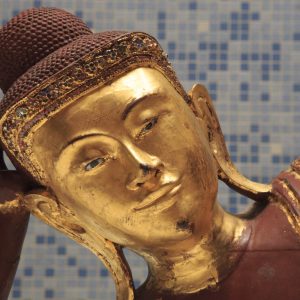
Does the Buddha Still Have Preferences?
We asked Professor Doug Powers about the role of personal preferences for cultivators.
Understanding preferences from the vantage points of karma and of samadhi (i.e., stillness of the mind) what happens to preferences as you cultivate? There are two answers. First, from the vantage point of karma, the entirety of cultivation is having positive preferences over negative. So, the whole of dharma is about changing your system of preferences. You can say that the Buddha asked you to choose preferences that cause less suffering and get into habits of generosity, of patience, of vigor, etc.. Even meditation is a preference. Therefore, there is a preference to not have suffering. So, those things that lead to less suffering all feel as pleasurable and the feedback loop of feeling pleasure is an actual useful tool in cultivation, without which I don’t even know how anyone would cultivate.
Second, there is the answer of samadhi and where the mind is at any given time. In that regard, the more still the mind is, the less preferences it has; the less the mind is interested in preferences, the less it is deciding one thing over another as more interesting. Therefore, you can say that the mind cultivating, meditating, and working toward some form of samadhi is actually developing a mind that has little or no preferences. The actual karmic effect of that on the day to day life of somebody is actually changing their preferences.
The two of them go together. The more you don’t have preferences you had from the past by having greater amount of freedom and stillness in mind, allows you to create more freedom from past karma for new possibilities to arise.
Now, if you’re on the bodhisattva path, you’re transforming a life of your preferences as the guiding light of what’s going on with yourself to get rid of those preferences so that other people’s karmic conditions, which include preferences, are something that you are directly in contact with. In order to do that, you have to get rid of your own which now takes up all of your attention. So, you have to get rid of your own preferences in order to engage other people’s preferences. The sravaka practice is about ending all preferences. The pratyekabuddha practice is about actually seeing the causes and conditions of all preferences.
Are preferences inherently bad?
The idea that preferences are inherently bad is a big mistake because the only way that anyone is going to ever cultivate is by transforming their preferences. The idea that you will get past preferences directly by little samadhi/stillness/emptiness is way off. It might happen in an instantaneous moment or even be maintained in a session, or even be maintained in half a year of cultivation. At the end of the day you will always come back to the issue of transforming preferences as what really makes a difference over time. Actually maintaining that level of samadhi over enough time to surpass the power of preferences, is, I would say, very unlikely for most people or almost all people.
What’s the relationship between preferences and samadhi, i.e. stillness of the mind?
Preference is an opinion about the enjoyment or suffering of a dharma. Preferences don’t operate in empty space, they operate around dharmas. Preferences accompany dharmas karmically. So, each person’s dharmas that arise have preferences built in. These preferences to like or dislike are already karmic. If we are operating in greater amounts of stillness, that means the mind is not habitually taken up so much by dharmas that are habitually arising.
As the mind empties, it attends less to the dharmas that are arising. With less dharmas arising, the whole issue of preferences begins to disappear, because preferences that accompany those dharmas, either for or against or liking or disliking them, also disappear. Once dharmas disappear, preferences disappear. Stillness is simply having a mind that isn’t constantly taken over so quickly by dharmas, thoughts, or emotions. It has a little bit of space of consciousness that isn’t immediately taken up by something.
How does having preferences differ from having discernment?
Preference has nothing to do with discernment. Confusing discernment with preferences is a complete mistake. Bodhisattvas discern. In fact, their level of discernment is a lot greater than ours. Discernment is being clear about what is really going on. It is something that grows with cultivation. Since you’re not trapped in your own preferences, it gives the mind freedom to actually see what is going on in a way that can discern things in the actual dynamics and causation of what is appearing. If you can get to a certain amount of stillness, you no longer need to use your theories to make sense out of it. Those theories may be good or bad depending on different circumstances, but they’re still just theories that you are using to oversee it. The less attachment to position creates more discernment. Less preference is more discernment. So, discernment is almost exactly the opposite of preference.


